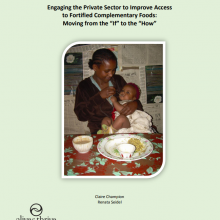Journal article
Oct 01 2016

The cost of not breastfeeding in Southeast Asia (Walters, D., 2016. Health Policy and Planning)
Rates of exclusive breastfeeding are slowly increasing, but remain sub-optimal globally despite the health and economic benefits.
Journal article
Sep 28 2016

Infant formula feeding at birth is common and inversely associated with subsequent breastfeeding behavior in Viet Nam (Nguyen TT., 2016. Journal of Nutrition)
Alive & Thrive (A&T) examined the association of infant formula feeding during the first 3 days after birth with subsequent infant formula feeding and early breastfeeding cessation in Viet Nam to better understand how this impacts breastfeeding outcomes.
Journal article
Sep 01 2016

Changes in knowledge, attitude and involvement of fathers in supporting exclusive breastfeeding: A community-based intervention study in a rural area of Viet Nam (Bich TH., 2016. International Journal of Public Health)
A one-year intervention in Viet Nam sought to understand how fathers’ knowledge, attitudes, and involvement in supporting exclusive breastfeeding (EBF) might change after receiving breastfeeding education materials and counseling services.
Journal article
May 19 2016

Progress in improving provincial plans for nutrition through targeted technical assistance and local advocacy in Viet Nam (Harris, J., 2016. Health Policy and Planning)
In an effort to support Viet Nam's efforts to decentralize nutrition planning, A&T provided targeted assistance and capacity-building for 15 provincial plans for nutrition (PPNs).
Journal article
Aug 31 2015

Maternal willingness to pay for infant and young child nutrition counseling services in Viet Nam (Nguyen, P.H., 2015. Global Health Action)
Alive & Thrive (A&T) Viet Nam, developed and incorporated elements of social franchising into government health services to provide high-quality nutrition counseling services to improve infant and young child feeding (IYCF) practices.
Report
Feb 27 2015

Engaging the Private Sector to Improve Access to Fortified Complementary Foods: Moving from the “If” to the “How”
Examines private sector engagement in improving access to fortified complementary foods for children 6‒24 months of age.

